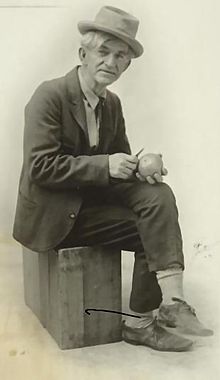Born Yesterday is a play written by Garson Kanin which premiered on Broadway in 1946, starring Judy Holliday as Billie Dawn. The play was adapted into a successful 1950 film of the same name.
Life with Father is a 1939 play by Howard Lindsay and Russel Crouse, adapted from a humorous autobiographical book of stories compiled in 1935 by Clarence Day. The Broadway production ran for 3,224 performances over 401 weeks to become the longest-running non-musical play on Broadway, a record that it still holds. The play was adapted into a 1947 feature film and a television series.

Barefoot in the Park is a romantic comedy stage play by Neil Simon. The play premiered on Broadway in 1963, starring Robert Redford and Elizabeth Ashley. It was made into a film in 1967, which starred Redford and Jane Fonda.

Harvey is a 1944 play by the American playwright Mary Chase. She received the Pulitzer Prize for Drama for the work in 1945. It has been adapted for film and television several times, most notably in a 1950 film starring James Stewart and Josephine Hull.
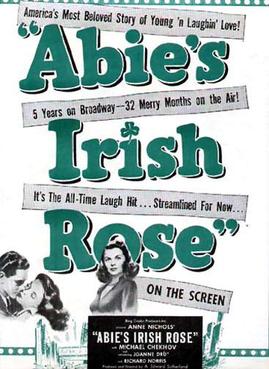
Abie's Irish Rose is a popular comedy by Anne Nichols, which premiered in 1922. Initially a Broadway play, it has become familiar through repeated stage productions, films and radio programs. The basic premise involves an Irish Catholic girl and a young Jewish man who marry despite the objections of their families.
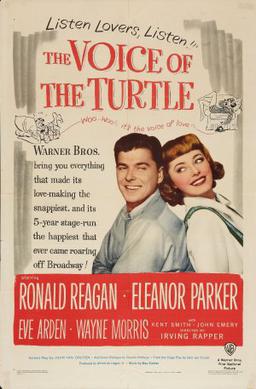
The Voice of the Turtle is a 1947 American romantic comedy film directed by Irving Rapper and starring Ronald Reagan, Eleanor Parker, Eve Arden and Wayne Morris. It was produced and distributed by Warner Brothers. It was based on the long-running 1943 stage play The Voice of the Turtle by John Van Druten. In the 1950s, the film was rereleased and aired on television under the title One for the Book.
Max Gordon was an American theater and film producer. His credits included My Sister Eileen, which he produced both on stage and on film.

Gemini is a 1976 American play by Albert Innaurato that became the fourth longest-running non-musical play in Broadway history.
Mary, Mary is a play by Jean Kerr. After two previews, the Broadway production opened on March 8, 1961, at the original Helen Hayes Theatre, where it ran for nearly three years and nine months before transferring to the Morosco, where it closed on December 12, 1964, after 1572 performances, making it the longest-running non-musical Broadway play of the 1960s.

Lightnin' is a 1925 American silent comedy film directed by John Ford. It was based on a successful play of the same name. The original run of the play started in 1918 at the Gaiety Theatre and continued for 1,291 performances, breaking the record for longest running play at that time. The film was remade in 1930 by Henry King for Fox as an early talkie starring Will Rogers with support from Louise Dresser and Joel McCrea.
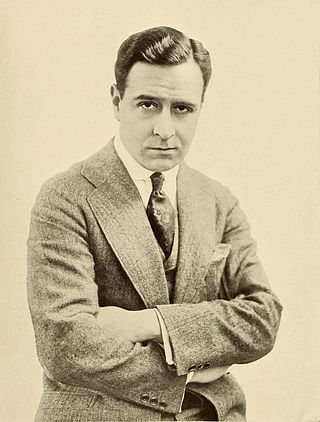
Conway Tearle was an American stage actor who went on to perform in silent and early sound films.
The Teahouse of the August Moon is a 1953 play written by John Patrick adapted from the 1951 novel by Vern Sneider. The play was later adapted for film in 1956, and the 1970 Broadway musical Lovely Ladies, Kind Gentlemen.
The Voice of the Turtle is a Broadway comedy by John William Van Druten dealing with the challenges of the single life in New York City during World War II. Controversial in its time, The Voice of the Turtle explores the sexual struggles of Sally Middleton, a young woman attempting to reconcile her childhood teachings on the importance of chastity with her newfound affection for Bill Page. The play derives its name from a verse in the Song of Solomon in the Bible, which reads "The voice of the turtle [as in turtle dove] is heard in our land." On December 8, 1943, the show opened at the Morosco Theatre and ran for 1,557 performances, making it the 51st longest-running show and the 9th longest-running play in Broadway history. In 1947, the stage play was adapted into a film of the same name starring Ronald Reagan, Eleanor Parker, Eve Arden, and Wayne Morris.
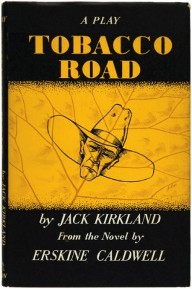
Tobacco Road is a play by Jack Kirkland first performed in 1933, based on the 1932 novel of the same name by Erskine Caldwell. The play ran on Broadway for a total of 3,182 performances, surpassing Abie's Irish Rose to become the longest-running play in history at the time. As of 2023, it was still the 20th longest-running Broadway show in history, as well as being the second-longest running non-musical ever on Broadway.

Frank Bacon, was an American character actor and playwright who after years of relative obscurity achieved great success as he entered the twilight of his career. The 1918 play Lightnin', which Bacon co-wrote and starred in, set a Broadway record for the day of 1,291 performances and was still going strong on tour after more than 700 shows when Bacon was forced to bow out due to fatigue. His death from a heart attack followed a week later.

John Lionel Golden was an American actor, songwriter, author, and theatrical producer. As a songwriter, he is best-known as lyricist for "Poor Butterfly" (1916). He produced many Broadway shows and four films.

Winchell Smith was an American playwright, known for big hit works such as Brewster's Millions (1906) and Lightnin' (1918). Many of his plays were made into movies. He spent freely but left a large fortune at his death.

Lightnin' is a 1930 American pre-Code comedy film directed by Henry King and written by S. N. Behrman and Sonya Levien. The film stars Will Rogers, Louise Dresser, Joel McCrea, Helen Cohan, Jason Robards Sr. and Luke Cosgrave. The film was released on December 7, 1930, by Fox Film Corporation. It is a remake of the 1925 silent film, which was directed by John Ford, which itself was based on the 1918 play.
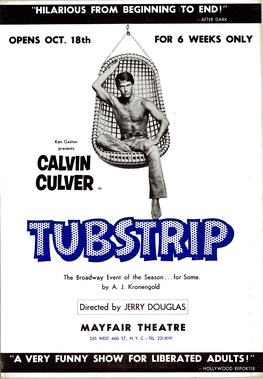
Tubstrip is a risqué comedy set in a gay bathhouse written by Jerry Douglas. The original production, also directed by Douglas, premiered off-Broadway in 1973, played in eight other cities, and then opened on Broadway in 1974 with adult film star Casey Donovan in the lead role.
